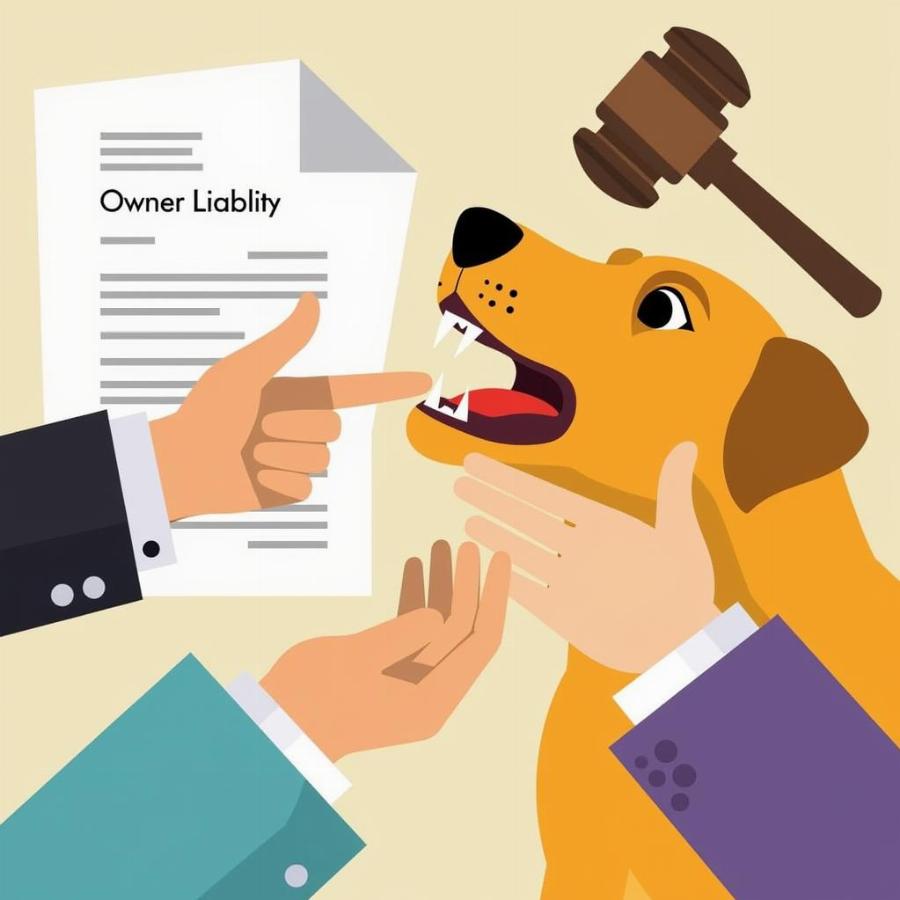The recent headline “woman sentenced to 15 years” might spark curiosity, leading some to wonder if the legal system now extends to our canine companions. While the specific case likely involves a human, it begs the question: Can dogs face legal repercussions for their actions?
This article delves into the intriguing relationship between dogs, the law, and the often-complex issue of canine liability. We’ll explore how legal systems approach dog-related incidents and what consequences, if any, are in store for our furry friends.
Dogs and the Law: Understanding Liability
When it comes to dogs and the legal system, the focus shifts from “punishing” the animal to addressing the responsibility of the owner. The legal principle of “strict liability” often comes into play, meaning dog owners can be held accountable for their dog’s actions, even if they weren’t directly at fault.
 Dog Bite Law Illustration
Dog Bite Law Illustration
This legal approach recognizes that while dogs are beloved companions, they are also animals with instincts that can sometimes lead to unpredictable behavior. Therefore, the onus falls on owners to ensure their dog’s actions don’t infringe on the safety and well-being of others.
Consequences for Dog Owners: Beyond “Dog Jail”
Contrary to what the phrase “woman sentenced to 15 years” might suggest, dogs themselves don’t face jail time for their actions. Instead, consequences are typically directed towards the owner and can vary widely depending on the severity of the incident and local laws.
Here are some potential outcomes:
- Fines: Owners might face financial penalties for their dog’s behavior, especially if it violates local ordinances like leash laws or barking regulations.
- Restitution: If a dog’s actions result in damages or injuries, owners may be ordered to compensate the affected party for medical bills, property damage, etc.
- Behavioral Training: In cases involving aggression or biting, courts may mandate professional training for the dog to address underlying behavioral issues and prevent future incidents.
- Euthanasia: While considered a last resort, euthanasia may be ordered in extreme cases where a dog is deemed a significant threat to public safety, often involving severe attacks or a history of aggression.
“The goal of legal consequences isn’t to punish the dog but to ensure public safety and encourage responsible ownership,” says renowned canine behaviorist Dr. Emily Parker. “Focusing on training, responsible pet ownership, and understanding dog behavior is crucial to minimizing potential risks.”
Preventing Legal Issues: Proactive Steps for Dog Owners
The best way to navigate the complexities of dog-related legal matters is to avoid them altogether. Here are some proactive measures every responsible dog owner should consider:
- Socialization and Training: Early socialization and consistent training are paramount in shaping a well-adjusted dog.
- Leash Laws: Adhering to leash laws when in public spaces ensures your dog’s actions are under your control.
- Secure Fencing: If you have a yard, ensure the fencing is secure enough to prevent your dog from escaping and potentially causing trouble.
- Understanding Body Language: Familiarize yourself with canine body language to recognize signs of stress, fear, or potential aggression, allowing you to intervene proactively.
Conclusion: Prioritizing Responsible Dog Ownership
While the idea of a “woman sentenced to 15 years” likely involves a human, it serves as a stark reminder of the responsibility that comes with dog ownership. While our furry companions won’t face jail time, their actions can have legal and financial ramifications for their owners.
By embracing responsible ownership practices, prioritizing training and socialization, and understanding the law’s approach to canine liability, we can create a safer environment for both our beloved pets and the community around us.
Frequently Asked Questions
1. Can my dog be taken away from me because of its behavior?
In severe cases where a dog is deemed dangerous or its owner is deemed unfit, authorities may remove the dog from the owner’s care.
2. What should I do if my dog bites someone?
Seek immediate medical attention for the injured party and exchange contact and insurance information with the other party involved. It’s essential to be honest and cooperative with authorities and to contact your own insurance company.
3. Is there a “one-bite rule” that protects me from liability the first time my dog bites someone?
The “one-bite rule” is a misconception. Laws vary by jurisdiction, but owners can be held liable for their dog’s actions even if it’s a first-time incident.
4. What constitutes a “dangerous dog” in the eyes of the law?
The definition of a “dangerous dog” varies depending on local ordinances but often involves dogs with a history of aggression, biting, or posing a significant threat to public safety.
5. Do I need insurance if I own a dog?
While not always legally required, having liability insurance that covers dog-related incidents is highly recommended. It can protect you financially in case of lawsuits or claims arising from your dog’s actions.
Exploring Further:
- Dog Bite Prevention Tips
- Understanding Canine Body Language
- Local Leash Laws and Regulations
For further assistance and expert advice on dog-related matters, contact Beaut Dogs at [email protected]. Beaut Dogs** is your trusted source for comprehensive information on all aspects of dog ownership, offering valuable insights, resources, and guidance to ensure the well-being of your furry companion.